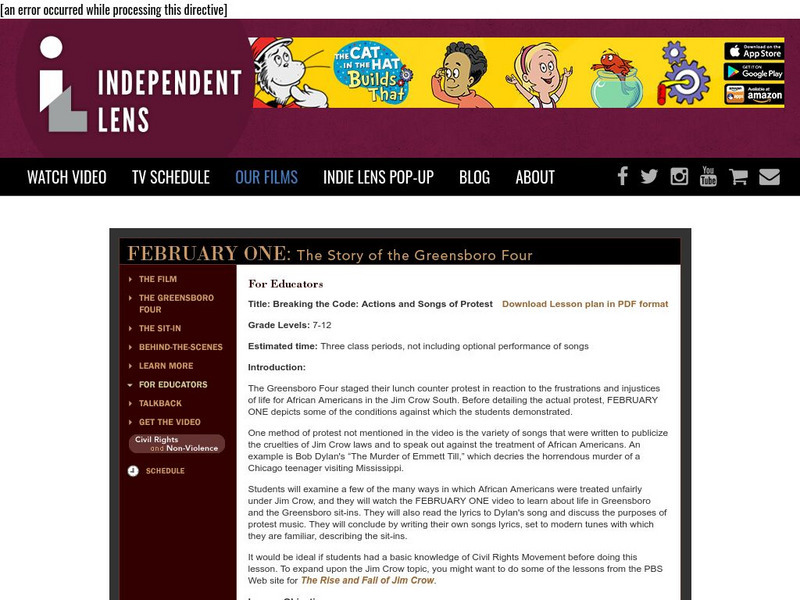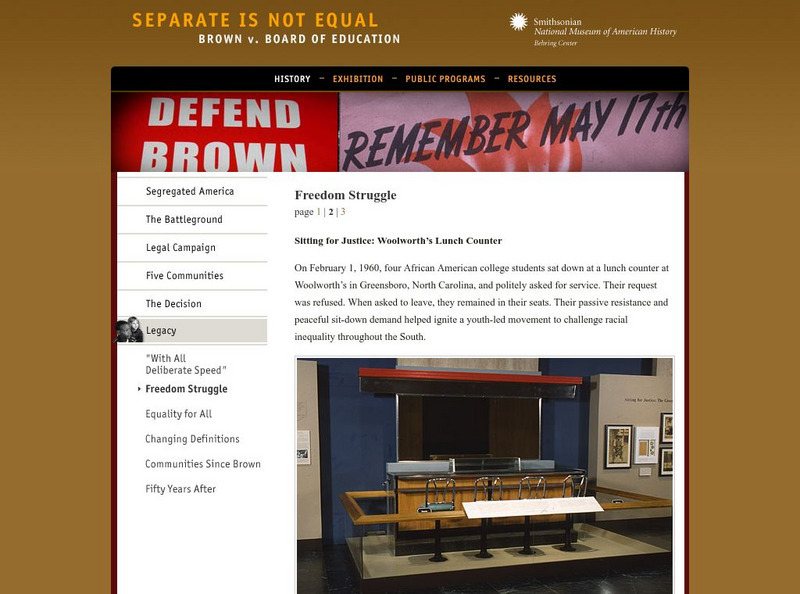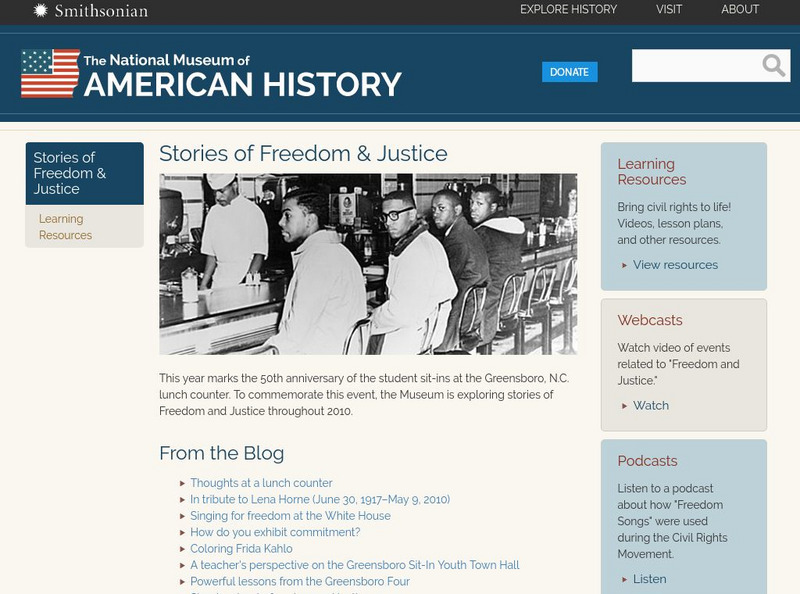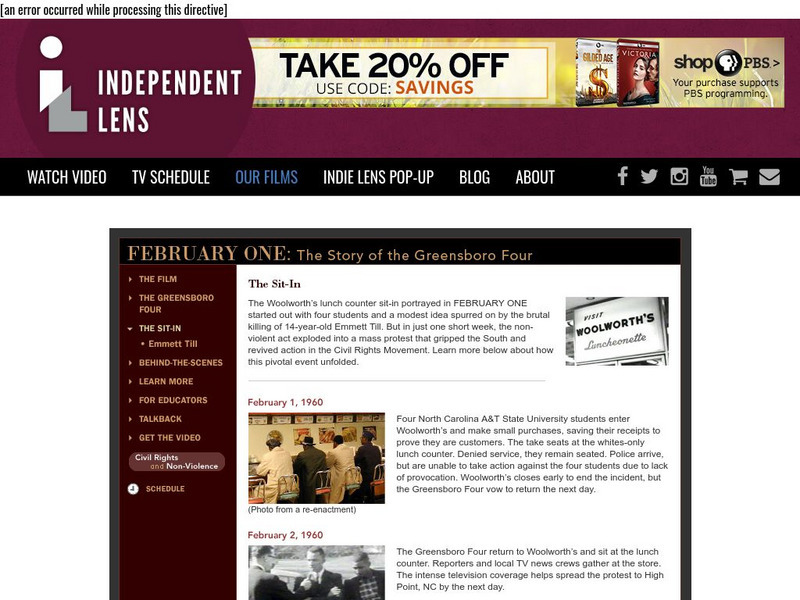Independence Hall Association
U.s. History: The Sit in Movement
Just like the Montgomery Bus Boycott, the first sit-in at a Woolworth's lunch counter was the beginning of a nonviolent movement to challenge "white only" laws. Read about how the sit-in movement spread across the South. See how...
Library of Congress
Loc: African American Odyssey: Sit Ins, Freedom Rides, and Demonstrations
The Civil Rights Era explores African American history in the 1960s, the fight against racial discrimination and segregation, and the search for justice through "freedom rides," boycotts, sit-ins, legislation, and marches.
PBS
Pbs Teachers: February One (Lessons on the Greensboro Sit in of 1960)
Find two lesson plans developed for a PBS documentary about the Greensboro Four, whose sit-in at a whites-only Woolworth's lunch counter was a key event in the unfolding history of the civil rights movement. The lessons ask students to...
OpenStax
Open Stax: Contesting Futures: America in 1960s: Civil Rights Movement Marches On
An examination of the civil rights movement of African Americans in the 1960s. Discusses the different forms of protest, the influence of Martin Luther King, Jr., the rise of Black Power, the Black Panthers, and Malcolm X. This is...
Smithsonian Institution
National Museum of American History: Separate Is Not Equal: Sitting for Justice: Woolworth's Lunch Counter
Read a brief description of the sit-in at the Woolworth lunch counter in Greensboro, North Carolina. This sit-in, passive and non-violent resistance to segregation laws, lasted for six months.
Smithsonian Institution
National Museum of American History: Stories of Freedom and Justice
To celebrate the 50th anniversary of the student sit-ins at the Greensboro, NC. lunch counter, the NAMH has produced this excellent collection of resources centered on the theme of freedom and justice. Experience this important part of...
Other
Core: Sit Ins
A brief description of the role of the sit-in as a non-violent way to protest segregation in the South.
PBS
Pbs: Independent Lens: February One: The Story of the Greensboro Four
Follow the course of the sit-ins at the lunch counter at Woolworth's in Greensboro, South Caroina during the first week of February, 1960.
Digital History
Digital History: Discrimination in Public Accommodations [Pdf]
Segregation and Jim Crow laws codified a color line in the United States. African-Americans began pushing back against segregation in the 1950s and 1960s. Read about the non-violent actions taken and how these actions resulted in the...
ibiblio
Ibiblio: Student Nonviolent Coordinating Committee
Two months after the Greensboro sit-ins, the Student Nonviolent Coordinating Committee (SNCC) was formed to coordinate the sit-ins and other forms of social activism against white oppression.
Digital History
Digital History: Freedom Now
When four African American North Carolina Agricultural and Technical College students refused to leave the lunch-counter at the F.W. Woolworth store in Greensboro they started the first non-violent, "sit-in" movement. Although the...
Other
International Civil Rights Center: Explore History: Civil Rights Movement
In 1960, four students at North Carolina A&T University decided to protest segregation laws by staging a sit-in at the Woolworth store lunch counter. Their action sparked a nation-wide protest by students that spread from just...
Curated OER
Time, Inc: A Brief History of the Sit in Movement
Time features an excellent report detailing the history of the sit-in movement which began on February 1, 1960 by four young men inside a Greensboro, North Carolina Woolworth's.
Utah Education Network
Uen: Themepark: Liberty: Civil Rights
Find a large collection of internet resources organized around civil rights. Links to places to go, people to see, things to do, teacher resources, and bibliographies.
Other
Ahc: Civil Rights Movement: The Surge Forward: 1954 1960
Detailed discussion of the civil rights movement between 1954-1960 including summaries of events such as Brown v. Board of Education of Topeka, Rosa Parks & the Montgomery Bus Boycott, 1955-1956, school desegregation, Sarah Keys v....
Khan Academy
Khan Academy: Sncc and Core
Read about the Congress for Racial Equality (CORE) and the Student Nonviolent Coordinating Committee (SNCC), two groups that played pivotal roles in organizing nonviolent protests during the Civil Rights Movement of the 1950s and 1960s.
Raleigh Charter High School
Mrs. Newmark's Page: Civil Rights
This interactive activity focuses on the Civil Rights Movement.













